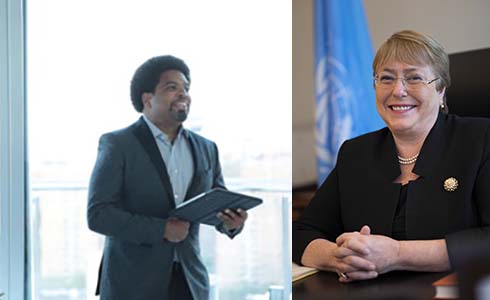United Nations Human Rights Office and The New School Forge New Partnership For a Human Rights Economy |
New York, August 24, 2022—The United Nations Office of the High Commissioner for Human Rights (OHCHR) and The New School’s Institute on Race, Power and Political Economy announced today a global partnership to advance scholarship and economic policy-making towards achieving human rights. The new “Partnership For a Human Rights Economy” is seeded in a common conviction that economic, social and cultural rights, including the rights to health, education, social security and decent work including a living wage and labor rights, are core to an inclusive economic model. The partnership will seek to develop the conceptual underpinnings of a human rights economy, working internationally across countries and through the multilateral system. Michelle Bachelet, UN High Commissioner for Human Rights, said today, “I welcome this important partnership, which comes at a time when the lives and livelihoods of many people and the health of the planet are at serious risk due to the existence of concurrent crises. The current moment challenges us to forge new and more ground breaking steps to ensure the protection of economic, social and cultural rights, including by questioning some of our accepted economic concepts and policies." “Human rights are guardrails to help us rescue the 2030 Agenda for Sustainable Development, dismantle structural drivers of exclusion and inequality and prevent instability and conflict. This collaboration can help inform economic solutions that depart from traditional approaches and add conceptual clarity for economies that place human rights and equality at their center." Dr. Dwight A. McBride, President of The New School, said, “In this period of intense political polarization and upheaval—unleashed by extreme economic inequality, racial injustice, climate change on a planetary scale, and the COVID-19 pandemic—The New School is honored to partner with the United Nations in the development of an economic framework that will speak to the struggles of ordinary people in every country and deliver on racial, gender and economic justice. Our partnership seeks to bring people together to create a roadmap for a profoundly more inclusive economy rooted in human rights, and we welcome everyone who wishes to join us on this journey.” The Partnership for a Human Rights Economy will convene experts, policy makers and advocates to advance concepts on economic and social rights, linking them with economic decision-making and sustainable development issues. It aims to develop scholarship and programs with a diverse array of stakeholders in support of evidence-based policy solutions to reduce inequalities and poverty. Professor Darrick Hamilton, Director of The Institute on Race, Power, and Political Economy, said, “Our history of disenfranchisement is well documented both across and within nation-states. Countries across the Global South, and descendants from Africa and Indigenous peoples across the world have long been exploited and excluded from full economic participation. A human rights economy presents a potent structural and policy apparatus to combat that."“Our economies have been grounded in a limited and skewed notion of rights, not the economic rights of people, but the economic rights of property. This conception of rights is devoid of an honest reckoning of the violence and the immoral practices by which that property came to be distributed in the first place." “It’s time we anchored the idea of inclusive economic and social rights as the very basis of a moral and human rights economy. Fundamental is acknowledging the ways in which race, ancestral origins, gender and other social identities have long been weaponized to serve the interests of those with power - all at the expense of the many, and of democracy itself." Todd Howland, Chief, Development and Economic and Social Rights Branch, at OHCHR, said, “Often, the popular understanding of human rights overlooks how the UDHR was conceptualized as a means to provide freedom from want and fear. Our collaboration with The New School’s Institute for Race, Power and Political Economy is a means to recapture its spirit and letter, where human rights was to provide useful guardrails for all aspects of society–including economic policies–in all countries regardless of what economic or political system exists."“Obstacles to creating a human rights enhancing economy relate to power and entrenched interests, and explain why investments in education and health, for example, even when they have been shown to be beneficial to economic growth are not made. The partnership with the Institute will help us put human rights as preexisting legal obligations back into economic policy discussions and help change the power dynamic to create an economy that benefits everyone.” In the wake of World War II, the United Nations General Assembly issued the landmark 1948 Universal Declaration of Human Rights (UDHR)–civil, political, economic, social, and cultural rights–recognizing the inherent dignity of the human person and the equal and inalienable rights of all. This partnership will renew an emphasis on economic and social rights, further elaborated in the International Covenant on Economic, Social and Cultural Rights and understood within the indivisibility and interdependence of all human rights. Learning from the failures of exclusion from the past, the partnership will urge that the design, implementation and management of economic policies are consistent with human rights, and leaves no one behind and reaches those furthest behind first.The Partnership will be coordinated on behalf of the Institute on Race, Power and Political Economy by its Director of Research, Dr. Grieve Chelwa, and on behalf of the OHCHR by Marcella Favretto, Chief, Sustainable Development Section; Pradeep Wagle, Chief, Economic, Social and Cultural Rights Section; and Savitri Bisnath, Senior Economist, UN Human Rights’ Surge Initiative. Established in 2021, the Institute is a cross-disciplinary hub that works with practitioners, policymakers, advocates and scholars to propel transformational ideas, grounded in rigorous research, that dismantle inequalities and advance the realization of economic rights, inclusion and civic engagement worldwide. -------- Notes to editors More information about economic, social and cultural rights More information about the Institute on Race, Power and Political Economy More information about OHCHR’s Surge Initiative |
|
Founded in 1919, The New School was established to advance academic freedom, tolerance, and experimentation. A century later, The New School remains at the forefront of innovation in higher education, inspiring approximately 10,000 undergraduate and graduate students to challenge the status quo in design and the social sciences, liberal arts, management, the arts, and media. The university welcomes thousands of adult learners annually for continuing education courses and public programs that encourage open discourse and social engagement. Through our online learning portals, research institutes, and international partnerships, The New School maintains a global presence. OHCHR’s Surge Initiative |
 |
MARKETING AND COMMUNICATION |
| 79 Fifth Avenue New York, NY 10003 www.newschool.edu |
PRESS RELEASE |
Media Contacts: The New School |
|
|
